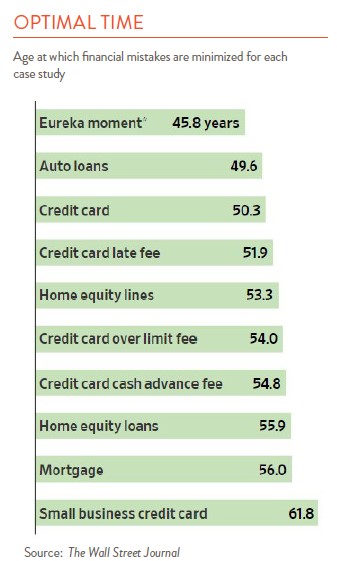An article in The Wall Street Journal recently noted that people’s financial literacy peaks around 53 or 54. At this age they are best able to make sound decisions around things like credit cards, interest rates, and whether a given fee is worth it or not.
This is good news, that people understand the importance of financial decisions and get better with age. But the discouraging fact is that at age 53 you don’t have many more years before you hope to stop working and if you have not made good decisions up to that point you don’t have much time to catch up.
Financial literacy is not rocket science. It doesn’t require a slide rule (old school) or sophisticated software (new school). It just requires common sense and a lot of discipline. A personal finance columnist at The Wall Street Journal once told me that covering the waterfront of personal finance takes only about 25 articles. After that the columnist, who obviously is intent on remaining employed, repackages previous articles, hoping his editor and the reader will think the advice is brand new!

The Wall Street Journal article noted that the 53-year-old at the peak of his financial literacy still tends to make one mistake. He fails to realize how long he will probably live, and therefore how much financial resources he needs in retirement. The average 50-year-old expects to live to 76, when in fact his statistical life expectancy is 86. Adding another 10 years to retirement adds an awful lot to expenses.
This is why it is super important to start early on building your nest egg. And one more thing I would add here that is crucial to achieving investment success; Warren Buffett likes to say that success in the market lies not with a high IQ but with a steady temperament. The average investor often buys after a market run up (performance chasing) and then sells after an extended decline (panic selling). Dalbar, the Boston based financial research firm has quantified this. Over the 30-year period ending December 2021, the S&P 500 returned an average of 10% per year, yet investors on average earned only 7.1%. Why the big difference? It is because investors don’t have the patience and steady temperament to deal with the market’s ups and downs. They buy at the top and sell at the bottom.
Financial literacy is important at all ages, but as noted, especially so when you are young. My very simple secrets to success for young people include, spend less than you earn, begin a regular savings plan, either for emergency needs or for retirement, and be very careful about borrowing. A mortgage for a house is fine, but carrying credit card debt month to month is a real no-no. And with your investments, choose a diversified portfolio of bonds and stocks in line with your needs and then practice your inner Warren Buffett – stick with your strategy through thick and thin. Get rich slowly. (Spoiler Alert, if you think I am blatantly repackaging true wisdom from past newsletter articles, you are absolutely right!)